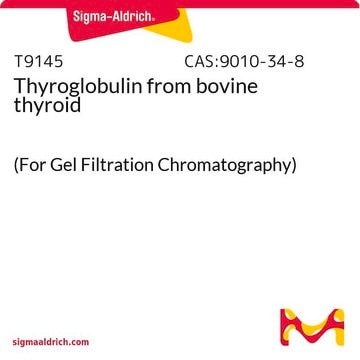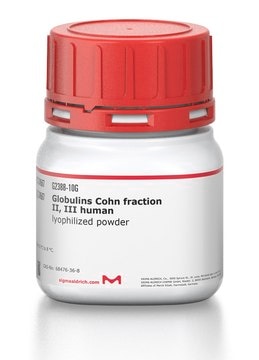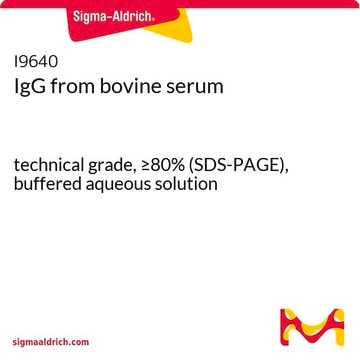G5009
γ-Globulins from bovine blood
≥99% (agarose gel electrophoresis)
Synonym(s):
Bovine γ-Globulin
Sign Into View Organizational & Contract Pricing
All Photos(5)
About This Item
Recommended Products
biological source
bovine blood
Quality Level
Assay
≥99% (agarose gel electrophoresis)
form
powder
composition
NaCl, ≤4%
technique(s)
enzyme immunoassay: suitable
solubility
0.9% NaCl: soluble 25 mg/mL
storage temp.
−20°C
Looking for similar products? Visit Product Comparison Guide
General description
Bovine gamma globulin (BGG) is an important component of the immune system of cows and other bovines. BGG is found in the blood of bovines and is primarily used in the production of medical products such as vaccines, serums, and diagnostic reagents. BGG can also be used to treat certain medical conditions, such as hepatitis B, as well as to boost immunity in humans and other animals.
Application
Bovine γ-globulins were used to study the constituents and pH changes in protein rich hyaluronan solution which affect the biological properties of artificial articular joints. It is also used to determine immunoglobulin G in bovine colostrum and milk using direct biosensor SPR-immunoassay.
Bovine γ-globulin has been used as an immunological challenge in studies of mechanisms of immunotolerance.
Biochem/physiol Actions
The γ-G globulins of bovine serum are categorized by anion exchange chromatography, immunoelectrophoresis, zone electrophoresis, ultracentrifugation, and analysis of the products of papain digestion. They have properties similar to analogous components of human serum. This was determined by the methods such as: gel filtration, immunoelectrophoresis, anion exchange chromatography, ultracentrifugation, and reduction with mercaptoethanol. Fast and slow γ-G globulins were classified on the basis of differences in electrophoretic migration rates, chromatographic elution positions, and biological activities (complement fixation). Bovine γ-A was conditionally found in immunoelectrophoretic analyses of serum and chromatographic fractions.
Preparation Note
Prepared from Cohn Fraction II, III
Storage Class Code
11 - Combustible Solids
WGK
WGK 3
Flash Point(F)
Not applicable
Flash Point(C)
Not applicable
Personal Protective Equipment
dust mask type N95 (US), Eyeshields, Gloves
Certificates of Analysis (COA)
Search for Certificates of Analysis (COA) by entering the products Lot/Batch Number. Lot and Batch Numbers can be found on a product’s label following the words ‘Lot’ or ‘Batch’.
Already Own This Product?
Find documentation for the products that you have recently purchased in the Document Library.
Customers Also Viewed
Harvey E Indyk et al.
Journal of AOAC International, 86(2), 386-393 (2003-05-02)
An automated biosensor surface-plasmon resonance-based assay was developed for the determination of immunoglobulin G (IgG) in bovine milk and colostrum with either goat or rabbit antibovine IgG or protein G used as detecting molecule. The method is configured as a
Marc-Olivier Montjovent et al.
Bioanalysis, 9(18), 1385-1393 (2017-09-29)
Recombinant glycoprotein produced in nonhuman mammalian cell lines can be modified with the immunogenic nonhuman sialic N-glycolylneuraminic acid (Neu5Gc). We describe here a validated method for detection of antidrug antibodies against both protein and Neu5Gc-containing glycan epitopes. An electrochemiluminescent method
Rui Fang et al.
eLife, 11 (2022-01-21)
The ring-like ATPase complexes in the AAA+ family perform diverse cellular functions that require coordination between the conformational transitions of their individual ATPase subunits (Erzberger and Berger, 2006; Puchades et al., 2020). How the energy from ATP hydrolysis is captured
S M Moreira et al.
Ecotoxicology and environmental safety, 73(5), 893-899 (2010-04-30)
This study proposes short-term sublethal assays for the tropics using the fish Poecilia reticulata. Assays were evaluated under realistic exposure scenarios by simulating a runoff over an agricultural area sprayed with deltamethrin (Decis). In situ assays were performed inside microcosms
Emmanuelle V LeBlanc et al.
Current protocols, 1(1), e17-e17 (2021-01-24)
Fungi infect over a billion people worldwide and contribute substantially to human morbidity and mortality despite all available therapies. New antifungal drugs are urgently needed. Decades of study have revealed numerous protein targets of potential therapeutic interest for which potent
Our team of scientists has experience in all areas of research including Life Science, Material Science, Chemical Synthesis, Chromatography, Analytical and many others.
Contact Technical Service













